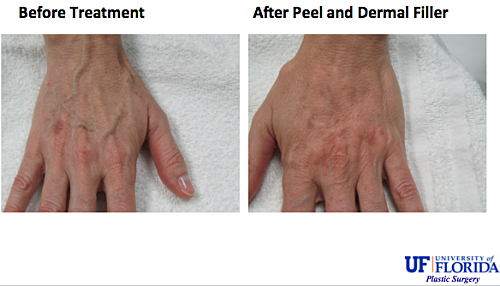Plastic surgery: Fact vs. fiction

Type the word “facelift” into a search engine and you’ll be overwhelmed with results. For instance, Google serves up 54 million results. When it comes to plastic surgery, society is in information overload. From advertisements to television shows to advice from friends and relatives, information about plastic surgery is everywhere — and it’s not always accurate.
To help us separate plastic surgery facts from fiction, Bruce Mast, M.D., UF’s chief of plastic and reconstructive surgery, weighs in:
Fiction: The name “plastic surgery” is due to the use of implants and other synthetic materials.
Fact: The term comes from the Greek word “plastikos,” which means to shape or to mold.
Fiction: Plastic surgery is never covered by health insurance.
Fact: Typically, insurers cover plastic surgery that restores, recreates or reforms aspects of physical appearance and function that have been affected by development, growth, disease or trauma. Some examples are breast reconstruction following a mastectomy, surgery to treat non-healing wounds, surgery following skin cancer treatment, surgery to correct obstructed breathing and surgery to correct eyelid conditions that affect vision.
Surgery done for improvement or correction of physical conditions, development, growth or aging is typically self-pay. The UF Health Plastic Surgery and Aesthetics Center personnel encourage you to speak with your physician and insurance provider about coverage for your specific procedure.
Fiction: There is an age cut-off for plastic surgery procedures.
Age is a consideration, but the overall health and fitness of an individual is the most important factor.
Fiction: There are no treatments available to make hands look younger.
Fact: Dermal fillers, or collagen, take only a few minutes and produce immediate results. They are very quick and painless, with many patients electing to take care of the procedure during their lunch hour. Results are noticeable immediately and depending on the type of injection you choose, can last up to one year.
Fiction: Silicone breast implants are unsafe.
Fact: In 2011, the Food and Drug Administration released findings that confirmed the safety of silicone gel-filled breast implants. However, silicone gel-filled implants may change over time, as does a woman’s body, so a breast revision may be necessary.
Fiction: Tummy tucks can only be done if you stay in the hospital.
Fact: A tummy tuck, known in the medical field as abdominoplasty, is a procedure conducted to remove excess or loose skin and fat from the abdomen. Tummy tucks are frequently combined with liposuction. While this procedure is traditionally done in the hospital, it may be safely done as an outpatient procedure — but only with carefully selected patients and in appropriately accredited facilities.
Do you have more questions about plastic surgery procedures? Request a free consultation with the UF Health Plastic Surgery and Aesthetics Center.